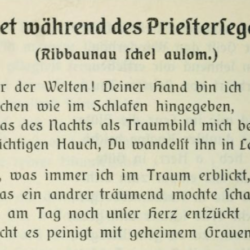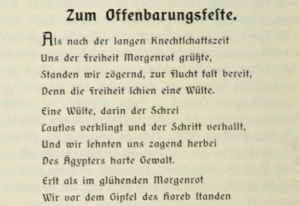TOGGLE COLUMNS (on/off):ADJUST COLUMN POSITIONS: select the column header cell and drag it where you want. show me!COPY INDIVIDUAL COLUMN(S): use CopyTables, a browser extension.
| Source (German) | Translation (English) |
|---|---|
Zum Offenbarungsfeste. |
For the Festival of Revelation. |
Als nach der langen Knechtschaftszeit Uns der Freiheit Morgenrot grüßte, Standen wir zögernd, zur Flucht fast bereit, Denn die Freiheit schien eine Wüste. |
When after the long period of slavery The dawn of freedom greeted us, We stood hesitant, almost ready to flee, For freedom seemed a wasteland. |
Eine Wüste, darin der Schrei Lautlos verklingt und der Schritt verhallt, Und wir sehnten uns zagend herbei Des Ägypters harte Gewalt. |
A wasteland in which screams Silently ebb and footsteps trail away, And we longed timidly for The Egyptian’s hard violence. |
Erst als im glühenden Morgenrot Wir vor dem Gipfel des Horeb standen Und in des ewigen Gottes Gebot Unserer Seele die Nahrung fanden, — |
Not until the glowing dawn when We stood before the summit of Horeb And in the command of the eternal God Did our souls find nourishment, — |
Erst als Gesetze, die in uns gelebt, Uns voll Klarheit klangen entgegen, Haben vor keinem Pfad wir gebebt, Fühlten uns sicher auf allen Wegen. |
Not until the laws lived in us, In full clarity they sounded to us, We did not tremble on any path, We felt safe on all paths. |
Da erst wurden wir wirklich befreit, Aus einer Horde zu einem Volke, Da erst fiel unser Sklavenkleid, Und wir folgten der feurigen Wolke. |
Only then were we truly liberated, From a horde to a people, Only then did our slave garb fall, And we followed the fiery cloud. |
Was uns damals der Morgen gebracht, Jenes Licht, nie konnt’ es erblassen, Und in der dunkelsten Zeiten Nacht Hat uns das Wort des Herrn nicht verlassen. — |
What the morning brought us back then, That light could never fade, And in the darkest hours of night The word of the Lord has not deserted us. — |
Führt’ uns durch jeder Wüste Graus, Schützt’ uns in wilden, verworrenen Zeiten, Wird aus der neuen Knechtschaft heraus Uns den Weg einst nach Zion geleiten. |
Lead us through every terrifying wasteland, Protect us in wild, confusing times, May our way out of the new bondage Lead us one day to Zion. |
Wird uns sammeln, die wir verstreut, Wird uns heilen, die wir voll Narben, Wird nach der langen Säezeit Ernten uns lassen einst goldene Garben. — |
May you gather us who are scattered, May you heal us who are scarred, May we after the long sowing time One day reap golden sheaves. — |
Wird unser heiliges Erbe sein, Das uns von Anbeginn war beschieden, Wird uns endlich nach bitterster Pein Führen zu ewigem Sabbatfrieden. |
May our sacred heritage be, That which was destined for us from the beginning, May you, after the most bitter torment, at last Lead us to unending Sabbath peace. |
“Zum Offenbarungsfeste” by Lise Tarlau can be found in Rabbi Max Grunwald’s anthology of Jewish women’s prayer, Beruria: Gebet- und Andachtsbuch für jüdische Frauen und Mädchen (1907), pages 340-341.
The transcription of the German provided machine-readable text for machine translations by DeepL, which we then edited for accuracy and clarity. We welcome any/all corrections, improvements, and additional transcriptions and translations of this work’s contents. –Aharon Varady
Source(s)


“Zum Offenbarungsfeste | Prayer for the Festival of Revelation (Shavuot), by Lise Tarlau (1907)” is shared through the Open Siddur Project with a Creative Commons Attribution-ShareAlike 4.0 International copyleft license.

![Abendlied | Evening prayer [for the Bedtime Shema], by Lise Tarlau (1907)](https://opensiddur.org/wp-content/uploads/2022/12/Abendlied-Lise-Tarlau-1907-cropped.png)








Comments, Corrections, and Queries